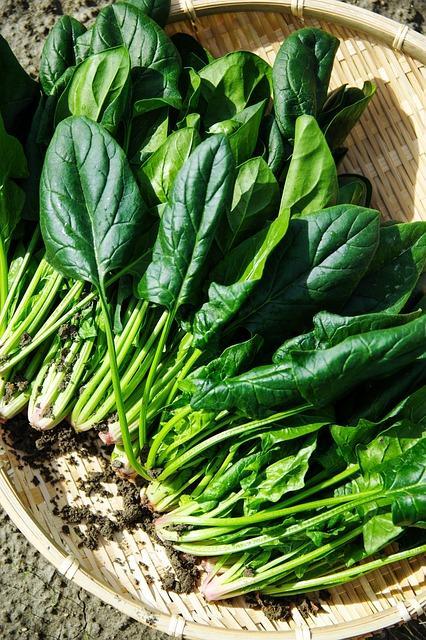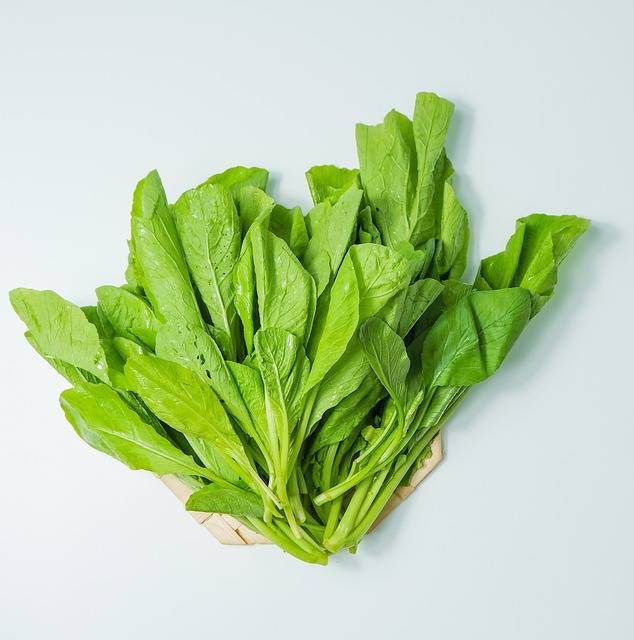Introduction:
Spinach, a nutrient-rich leafy green, boasts an impressive array of health benefits, making it a valuable addition to any diet. Packed with essential vitamins and minerals, including vitamin K, A, C, and folate, spinach supports overall immune function, bone health, and vision. Its high iron content aids in the prevention of anemia, while the presence of antioxidants like lutein and zeaxanthin contributes to eye health by protecting against age-related macular degeneration. Furthermore, spinach is a low-calorie food with a high fiber content, promoting satiety and aiding in weight management. Its rich folate content is particularly beneficial during pregnancy, supporting fetal development. Additionally, the abundance of phytonutrients in spinach exhibits anti-inflammatory properties, potentially reducing the risk of chronic diseases. Incorporating spinach into one’s diet not only enhances nutritional intake but also contributes to a healthier and more vibrant lifestyle.
Historical significance:
While spinach might not have the grandeur of some historical events, it has an intriguing history and cultural significance. Originating in ancient Persia (modern-day Iran), spinach found its way to China and eventually Europe through trade routes. It gained popularity during the Arab Empire and later became a staple in Mediterranean cuisine. Popeye, the iconic cartoon character created in the 1930s, played a surprising role in spinach’s history. During the Great Depression, Popeye’s creators promoted spinach as a symbol of strength, leading to a spike in spinach consumption. Beyond pop culture, spinach has been celebrated in various cultures for its health benefits. Rich in vitamins and minerals, it has been recognized for its role in promoting overall well-being. Its journey from Persia to global culinary integration highlights how seemingly mundane items like spinach can traverse cultures and epochs, leaving a lasting imprint on our collective history.
Nutritional Value:
Nutritional value refers to the content of nutrients present in a food item that contributes to the overall health and well-being of an individual. These nutrients are essential for various physiological functions, growth, development, and maintenance of the body. Understanding the nutritional value of foods is crucial for making informed and healthy dietary choices.

Caloric Content:
Spinach is renowned for its low-calorie content, with just approximately 7 calories per cup of raw spinach. This characteristic makes it an exceptionally attractive choice for individuals aiming to manage their caloric intake effectively.
Macronutrients:
Proteins: Spinach provides a moderate yet valuable amount of protein, a fundamental building block for muscle maintenance and repair.
Carbohydrates: Particularly low in carbohydrates, spinach is conducive to low-carb dietary preferences, offering a mix of simple and complex carbs.
Fats: Impressively low in fat, spinach aligns with dietary recommendations for those conscientious about fat consumption.
Micronutrients:
Vitamins:
Vitamin A: Abundant in beta-carotene, spinach contributes significantly to vitamin A intake, crucial for vision, immune function, and skin health.
Vitamin C: A powerful antioxidant, aiding the immune system and facilitating iron absorption.
Vitamin K: Essential for blood clotting mechanisms and optimal bone health.

Minerals:
Iron: While spinach contains iron, it’s worth noting the presence of compounds that may hinder absorption; however, combining it with vitamin C-rich foods can enhance iron bioavailability.
Calcium: Valuable for skeletal health.
Potassium: Contributes to maintaining healthy blood pressure levels.
Folate (B9): An integral component for DNA synthesis and repair, underscoring its importance during phases of rapid cell division, such as pregnancy and infancy.
Dietary Fiber:
A rich source of dietary fiber, spinach supports digestive health and aids in regulating blood sugar levels, making it a beneficial inclusion in balanced diets.
Antioxidants:
Spinach boasts an array of antioxidants, including flavonoids and carotenoids, actively combating oxidative stress and mitigating inflammation within the body.
Phytochemicals:
The presence of phytochemicals in spinach underscores its role as a natural source of compounds associated with various health benefits, including a potential reduction in the risk of chronic diseases.
Hydration:
With its high water content, spinach contributes to overall hydration levels, a crucial aspect of supporting bodily functions and maintaining optimal health.
Incorporating spinach into diverse culinary creations, whether consumed raw in salads or incorporated into cooked dishes, not only adds a delightful flavor but also introduces a wealth of nutrients, making it a versatile and nutritionally dense component of a well-rounded diet.

Benefits of Spinach:
-
-
Nutrient-Rich Powerhouse:
-
Spinach stands out as a nutritional treasure trove, delivering a diverse range of essential vitamins and minerals. Noteworthy components include vitamin A, C, and K, along with folate, iron, calcium, and potassium, collectively offering a comprehensive spectrum of nutrients crucial for holistic health.
-
-
Cardiovascular Support:
-
The amalgamation of potassium, folate, and antioxidants within spinach plays a pivotal role in cardiovascular well-being. Potassium regulates blood pressure, while folate aids in lowering homocysteine levels, mitigating the risk of cardiovascular diseases.
-
-
Bone Health Enhancement:
-
With its rich vitamin K and calcium content, spinach emerges as a key player in fortifying bone health. Vitamin K facilitates optimal calcium utilization and ensures robust bone mineralization.
-
-
Immune System Fortification:
-
Abundant in vitamin C, spinach acts as a potent antioxidant, bolstering the immune system by shielding cells from damage, fostering white blood cell production, and enhancing the body’s ability to combat infections.
-
-
Digestive Well-Being:
-
Spinach’s exceptional dietary fiber content promotes digestive health by averting constipation and fostering a harmonious gut microbiome. This fiber richness also contributes to stabilizing blood sugar levels.
-
-
Anti-Inflammatory Attributes:
-
The diverse array of antioxidants in spinach, including beta-carotene and flavonoids, confers anti-inflammatory properties. Regular consumption may potentially reduce systemic inflammation, mitigating the risk of chronic diseases.
-
-
Visionary Support:
-
Lutein and zeaxanthin, prominent carotenoids in spinach, contribute to ocular health by safeguarding against age-related macular degeneration and other vision-related ailments.
-
-
Blood Sugar Regulation:
-
The combined effects of fiber and magnesium in spinach may enhance insulin sensitivity, aiding in the regulation of blood sugar levels. This positions spinach as a valuable dietary component for diabetes management or prevention.
-
-
Weight Management Ally:
-
Boasting low-calorie and low-fat attributes, spinach is an ideal choice for individuals focused on weight management. Its high fiber content also promotes satiety, curbing the propensity for overconsumption.
-
-
Cancer Preventive Potential:
-
The presence of antioxidants and phytochemicals in spinach is associated with a decreased risk of specific cancers. These compounds actively neutralize free radicals and impede the proliferation of cancer cells.
-
-
Pregnancy Wellness:
-
Spinach emerges as a pregnancy-friendly food due to its rich folate content. Folate is instrumental in fetal development, significantly reducing the risk of neural tube defects in the developing baby.
-
-
Hydration Support:
-
Beyond its nutritional richness, spinach’s high water content contributes to overall hydration, a foundational element in supporting diverse bodily functions and sustaining optimal health.
Incorporating spinach into the culinary repertoire, whether in vibrant salads, nutrient-packed smoothies, or diverse cooked dishes, unveils a plethora of health advantages. Spinach not only elevates the taste profile of meals but also emerges as a versatile and invaluable contributor to comprehensive well-being.
Grow Spinach At Home:
To grow spinach at home, begin by choosing a suitable variety based on your climate and space. Select a well-drained site with partial shade, especially in warmer regions. Germinate seeds indoors, transplanting them once they develop true leaves. Plant in rows, maintaining proper spacing, and keep the soil consistently moist. Fertilize with a balanced fertilizer, thin seedlings as needed, and manage pests using organic methods. Harvest spinach when leaves are of usable size, either by picking outer leaves or cutting the entire plant. To ensure a continuous harvest, practice successive planting every 2-3 weeks. Prevent bolting by harvesting promptly and selecting slow-bolting varieties. In mild climates, overwinter spinach with row covers, and if desired, save seeds from mature plants for future cultivation. Growing spinach at home not only provides a fresh and nutritious addition to your diet but also offers the satisfaction of cultivating your own leafy greens.
Spinach Varieties:
1. Savoy Spinach:
Characterized by its crinkly, curly leaves, Savoy spinach is a popular choice with a robust, earthy flavor. The textured leaves make it an excellent option for holding sauces or dressings, and its resistance to bolting in warm weather enhances its versatility in various climates.
2. Flat-Leaf Spinach:
Also known as smooth-leaf or plain spinach, this variety features flat, smooth leaves. It is often preferred for its ease of cleaning and suitability for fresh salads. Flat-leaf spinach tends to be milder in flavor compared to Savoy, making it a versatile choice for both raw and cooked dishes.
3. Semi-Savoy Spinach:
Combining features of both Savoy and flat-leaf varieties, semi-Savoy spinach presents slightly crinkled leaves that are easier to clean than Savoy but still offer some texture. It strikes a balance between the robustness of Savoy and the simplicity of flat-leaf spinach.
4. Baby Spinach:
Harvested at an early stage of growth, baby spinach is known for its tender leaves and mild flavor. This variety is commonly used in salads, sandwiches, and smoothies, offering a delicate spinach taste without the intensity found in mature leaves.
5. New Zealand Spinach:
Botanically distinct from traditional spinach, New Zealand spinach (Tetragonia tetragonioides) is a heat-tolerant alternative. Its succulent leaves have a spinach-like taste and are often used in salads or as a cooked green. This variety is particularly suitable for warm climates.
6. Bloomsdale Spinach:
A classic heirloom variety, Bloomsdale spinach features dark green, heavily crinkled leaves. Its rich flavor intensifies with cooking, making it an excellent choice for sautéing, steaming, or incorporating into casseroles.
7. Malabar Spinach:
Not a true spinach but often used as a substitute, Malabar spinach (Basella alba) is a vining plant with fleshy, arrow-shaped leaves. Commonly grown in warmer climates, it offers a unique flavor and is popular in salads or as a cooked green.
8. Tyee Spinach:
Known for its resistance to bolting, Tyee spinach is a reliable choice in warm weather. It features dark green, semi-savoy leaves and maintains its quality well into the growing season, making it suitable for extended harvests.
9. Space Spinach:
Developed for its compact growth, Space spinach is an excellent option for small gardens or containers. It still produces ample, flavorful leaves despite its more restrained size, making it an ideal choice for those with limited space.
10. Indian Summer Spinach:
– A heat-tolerant variety, Indian Summer spinach is well-suited for warm climates. It maintains its flavor and texture even in higher temperatures, offering a continuous harvest option during hot seasons.
Whether you’re seeking the traditional crinkled leaves of Savoy, the simplicity of flat-leaf spinach, or exploring alternatives like New Zealand or Malabar spinach, the diverse array of spinach varieties allows for culinary creativity and adaptability to different growing conditions. Selecting the right variety can enhance both the flavor and success of cultivating this nutritious leafy green.
conclusion:
In conclusion, spinach stands as a nutritional powerhouse, offering a myriad of health benefits that make it a valuable addition to any diet. Packed with essential vitamins, minerals, and antioxidants, spinach promotes cardiovascular health, supports bone strength, and bolsters the immune system. Its rich fiber content aids in digestion and blood sugar regulation, while anti-inflammatory properties contribute to overall well-being. With its versatility in culinary applications, from salads to smoothies and cooked dishes, spinach provides a delicious and nutritious option for individuals aiming to maintain a healthy lifestyle. Whether you’re drawn to its vibrant green leaves for their visual appeal or incorporating it for its numerous health advantages, spinach undeniably earns its reputation as a nutrient-dense and versatile superfood. Regular inclusion of spinach in your diet not only tantalizes the taste buds but also nurtures the body, making it a green essential on the journey to optimal health.
FAQS:
Is spinach suitable for everyone?
While spinach is generally healthy, individuals with certain health conditions should consult their healthcare provider before making it a dietary staple.
Can spinach be eaten raw?
Yes, spinach can be enjoyed raw in salads or added to smoothies for a fresh and nutritious boost.
Are there any side effects of consuming too much spinach?
Excessive consumption may lead to oxalate-related concerns, so moderation is key. Individuals with kidney stones or thyroid issues should be cautious.
How can I incorporate spinach into my child’s diet?
Sneak spinach into smoothies, mix it into pasta sauces, or create fun and colorful salads to make it more appealing to children.
Is there a specific spinach variety recommended for home gardening?
Savoy and flat-leaf varieties are popular choices for home gardening due to their adaptability and ease of cultivation.
What are the health benefits of eating spinach?
Spinach is a leafy green vegetable that is packed with nutrients, including vitamins A, C, and K, iron, folate, and potassium. These nutrients provide a wide range of health benefits, including:
Boosting immunity: Spinach’s high vitamin C content helps support immune function.
Promoting eye health: Spinach contains carotenoids, which are essential for maintaining healthy eyesight.
Improving bone health: Spinach’s vitamin K and magnesium content contributes to bone strength.
Reducing inflammation: Spinach’s antioxidant content helps reduce inflammation throughout the body.
Supporting cardiovascular health: Spinach’s potassium and folate content helps regulate blood pressure and reduce the risk of heart disease.
How much spinach should I eat per day?
The recommended daily intake of spinach for adults is 1½ to 2 cups. However, you can start with smaller portions and gradually increase your intake as tolerated.
What are some ways to incorporate spinach into my diet?
There are many ways to enjoy spinach. Here are a few ideas:
Add spinach to salads: Spinach is a versatile addition to salads, providing both flavor and nutrition.
Incorporate spinach into smoothies: Spinach blends well into smoothies, adding a boost of nutrients without significantly altering the taste.
Cook spinach as a side dish: Sautéed or steamed spinach makes a delicious and nutritious side dish.
Use spinach in baking: Spinach can be added to muffins, pancakes, and other baked goods for an added nutritional boost.
Is spinach a good source of iron?
Spinach is a good source of non-heme iron, which is the type of iron found in plant foods. However, the absorption of non-heme iron is lower than that of heme iron, which is found in animal foods. To enhance iron absorption from spinach, pair it with vitamin C-rich foods, such as citrus fruits or bell peppers.
Does spinach help with weight loss?
Spinach is a low-calorie, nutrient-dense food that can be part of a healthy weight loss plan. Its high fiber content helps you feel full and satisfied, reducing overall calorie intake. Additionally, spinach’s nutrients support metabolic function and energy expenditure.
Can I eat raw spinach?
Yes, spinach is safe to eat raw. It has a mild flavor and crisp texture that can be enjoyed in salads, sandwiches, or as a snack on its own.
Are there any side effects of eating too much spinach?
Consuming excessive amounts of spinach can lead to hypervitaminosis A, which can cause symptoms like hair loss, dry skin, and joint pain. However, this is unlikely unless you consume well above the recommended daily intake.
How can I store spinach to maximize its freshness?
To keep spinach fresh, store it in an airtight container in the refrigerator. Properly stored spinach should last for up to 5 days.













